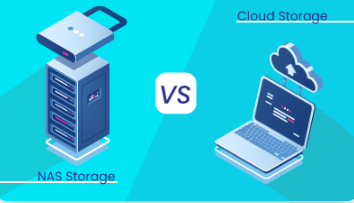
In today's ever-evolving business world, technology plays a vital role in enabling employees to communicate, collaborate and share data seamlessly. For businesses that have hybrid workforces, the need for reliable and scalable storage solutions becomes critical. With an array of storage solutions available, choosing the right option can be daunting. This article will provide insights into two popular storage solutions, Network-Attached Storage (NAS), and cloud storage, and help you decide which is best for your company.
What is Network-Attached Storage?
NAS is a centralized file storage system that is connected to the network, providing multiple users with access to data and files. It is a flexible and scalable option that can work well for businesses with multiple users and devices. NAS Storage can be accessed from anywhere in the world with an internet connection, making it an ideal solution for a hybrid workforce where employees are working both from the office and remotely.
What is Cloud Storage?
Cloud storage is a storage option in which data is stored on remote servers that can be accessed over the internet. Cloud storage providers offer various services ranging from data backup to file sharing to hosting. Cloud storage can be accessed via any device with an internet connection, and files can be transferred between users at lightning speeds.
How Do NAS and Cloud Storage Compare?
NAS and cloud storage offer different benefits and limitations. Below are key factors to consider:
Cost
NAS storage usually involves substantial upfront costs for hardware, maintenance, and installation. Cloud storage is subscription-based, so the monthly cost depends on the storage's size and usage.
Accessibility
NAS storage allows for fast and direct data access, making it ideal for companies that require high-speed access to data. Cloud storage is accessible from anywhere, making it more suited to businesses with remote workers.
Scalability
NAS is scalable, although expanding this solution can require purchasing additional hardware. On the other hand, cloud storage allows businesses to increase their storage capacity on-demand.
Security
NAS storage provides greater security measures than cloud storage as it can be used in-house, providing control of data and privacy. Cloud storage is more vulnerable to cybersecurity attacks, as data is stored remotely.
Backup and Recovery
NAS is an excellent backup solution as it offers local and remote backup functionality. Cloud storage also provides backup and recovery options, but as the data is stored remotely, restoring extensive backups can be slower.
Choosing the Best Option
To determine which storage solution is best for your organization, you need first to consider the needs of your organization. If your organization requires quick access to files with stringent data security and privacy requirements, a NAS solutions would be the best fit. However, if your organization has geographically dispersed employees, requiring off-site backups and disaster recovery, cloud storage would be the perfect f
Conclusion
In conclusion, choosing between NAS and cloud storage depends on your business's needs and preferences. If you have an in-house IT team and require high-speed data access, NAS storage may be the best option for you. In contrast, if you have a hybrid workforce and require flexibility and scalability, cloud storage may be the right choice. Both options have their advantages and disadvantages, and ultimately it depends on the budget, the size of your business, and the need for speed and data security. Whatever storage solution you choose, it should be reliable, secure, and scalable to meet your business needs.Would you like to explore the optimal solution for your business? Connect with our expert today and create a tailored NAS cloud storage solution that aligns perfectly with your requirements.
-z43sh.png)